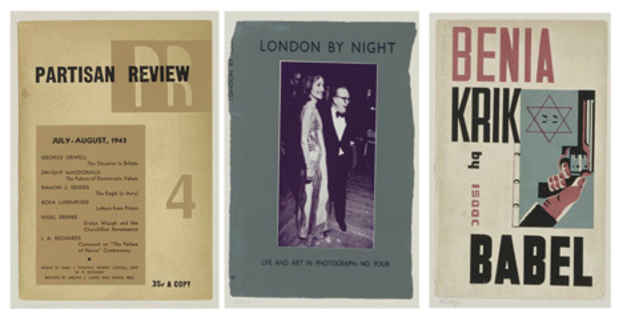R. B. Kitaj “Personal Library”
The Jewish Museum

This event has ended.
The figurative painter R. B. Kitaj (1932–2007) frequently took a literary approach to his subject matter, portraying friends and heroes—political, artistic, and philosophical—in intimate scenes both real and imagined. Often he playfully borrowed settings from other works of art, as well as from films and news photographs. The deep literary and conceptual underpinnings of his art are in evidence in the 1969 suite In Our Time, acquired by the Museum in 2010, a highly unusual body of work, even an anomaly, within his oeuvre.
The series is composed of fifty screenprints based on enlarged photographs of the bindings or jackets of books in his personal library. Stains, tears, and discolorations attest to each volume’s history and to its physical—and by implication intellectual—fragility. The range of texts and typographies conveys Kitaj’s eclectic interests and tastes. Most are prewar editions, conveying a slightly nostalgic tone.
In turning book covers into works of art Kitaj is offering fragments of a history of knowledge, in which the content of each volume is at once mysterious and absent. Coming from this passionate bibliophile, the series is nothing less than an intellectual self-portrait.
Stylistically, these are hybrid works, influenced by Pop art and the modernist tradition of the Readymade—a work of art created when a mundane found object is named as an artwork and set in an art context. This avant-garde concept had been invented by the Dada master Marcel Duchamp early in the twentieth century. In the 1960s it received renewed attention at a time when artistic norms were once again being questioned. Reacting to Andy Warhol’s Pop imagery, Kitaj poignantly called his repurposed book covers his soup can, his Liz Taylor. The blatant use of images taken directly from commercial sources situates In Our Time as a precursor of appropriation art.
Over the course of his forty-year career Kitaj became increasingly interested in Jewish ideas, particularly Jewish intellectual history and the Holocaust. A man of erudition and contradiction, he saw himself as the quintessential diasporic character: an American in London, a figurative artist working during the reign of abstraction, a modernist who venerated the art of the past, and a pragmatist in thrall to European history and culture.
Norman Kleeblatt, Susan and Elihu Rose Chief Curator
Media
Schedule
from April 05, 2013 to August 11, 2013